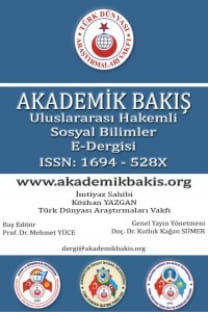HALK DANSLARINDA DEVRİMCİ BİR MİRAS: DOSTLAR HASAD ÇAĞDAŞ HALK DANSLARI TOPLULUĞU
Bu makalede Türkiye'de halk dansları alanında bilinen ilk devrimci deneyim olan HASAD Çağdaş Halk Dansları Topluluğu, nam-ı diğer Dostlar HASAD'ı, modernizm, sosyal kimlik gibi kültür teorileri bağlamında Marksist bir bakışla irdelemeye ve anlamaya çalışacağım. Diğer bir ifadeyle, HASAD'ın kuruluş felsefesi ve dansa bakışının modernizm ile olan ilişkisini, topluluğun yarattığı ve kendini anlamlandırdığı kimlikleri Marksizmin diyalektik ve sınıfsal bakışı ile yorumlamaya çalışacağım. HASAD Çağdaş Halk Dansları Topluluğu Avrupadaki toplumsal hareketlerin de etkisiyle Türkiyenin çalkantılı bir siyasal atmosfer yaşadığı 1970li yıllarda dönemin devrimci tiyatro topluluğu Dostlar Tiyatrosu bünyesinde tiyatro sanatçısı ve koreograf Mehmet Akan yönetiminde kuruldu. Kuruluş amaçlarından en önemlisi dönemin güncel toplumsal sorunlarına dans alanından yanıtlar üretmekti. Bu bakımdan Dostlar HASAD bir dans tiyatrosu olmasının yanı sıra bir siyasi oluşumdu. Dolayısıyla koreografileri Türkiyede geleneksel halk danslarında daha önce denenmemiş siyasi içeriklere sahip çağdaş temalardan oluşuyordu. Makalenin temelini henüz başlarında olduğum bir sözlü tarih projesinin ilk verilerinin ışığında oluşturmaya çalıştım. Dolayısıyla bu kapsamda görüştüğüm tiyatrocu ve dansçı toplam 7 kişinin tanıklıklarını alarak bunları yukarıda belirttiğim teoriler bağlamında yeniden anlamaya çalıştım. Bir kitap projesine kavuşturmayı umduğum bu çalışmanın ilk görüşmeleri usta tiyatro sanatçıları Genco Erkal, Arif Erkin, Levent Yılmaz ve HASAD dansçılarından Serdar Türkkan, Şerafettin Güner, Sezai Babakuş, Dostlar Tiyatrosu ve HASAD'ın kostüm tasarımcısı Sula Bozis ile gerçekleştirildi. Bu görüşmelerin yaklaşık 7 saati video kaydı altına alındı ve deşifre edildi. Türkiye'de halk dansları çevreleri tarafından pek bilinmeyen/görmezden gelinen bir geçmişin parçası olan HASAD'ın, alanımıza sunduğu "görünmez" katkının anlaşılması açısından bu çalışmayı önemsiyorum.
Anahtar Kelimeler:
Halk Dansları, HASAD, Modernizm, Sosyal Kimlik, Kültür Teorileri, Marksizm
A Revolutionary Heritage In Folk Dances: Dostlar HASAD Contemporary Folk Dances Company
In this article, I will try to understand and examine the HASAD Contemporary Folk Dance Ensemble, also known as Dostlar HASAD, -which is known as the first revolutionist attempt in folk dances-, in the context of cultural theories such as modernism and social identity from a Marxist perspective. In other words, I will try to interpret the relationship between modernism and the founding philosophy of HASAD, the identities that the ensemble created and gave the meaning, in the dialectical and class view of Marxism. HASAD Contemporary Folk Dance Ensemble is founded by the actor and choreographer, Mehmet Akan, within the formation of Dostlar Theater, which was a political theater during the 1970s, when Turkey had been experiencing a surging political atmosphere under the influence of the social movements in Europe. The most important goal of the foundation of the Dostlar Theater was to produce responses through dance for the contemporary social problems of that period. In this regard, besides being a dance theatre, Dostlar HASAD was also a political foundation. Hence, its choreographies composed by contemporary political themes that had not been previously tried within the traditional folk dances in Turkey. I tried to underlie this article in the light of the preliminary research that I have conducted on an oral history project. Therefore, I tried to re-understand the results of my research in the context of aforementioned cultural theories by taking testimonies of seven dancers, actors and actresses (7 person in total) that I interviewed within the scope of that project. The first interviews in this article, which I hope to turn to a monograph, were made with well-known actors, Genco Erkal, Arif Erkin and Levent Yılmaz, the HASAD dancers,; Serdar Türkkan, Şerafettin Güner, Sezai Babakuş, and Sula Bozis, the costume designer of HASAD and Dostlar Theater. Approximately seven hours of these interviews are recorded and deciphered. I value this study for its role in understanding the invisible contribution made to our folk dance field by HASAD, which is a part of the history that has been overlooked by the folk dance society in Turkey.
Keywords:
Folk Dance, HASAD, Modernism, Social Identity, Cultural Theory, Marxism,
- Başlangıç: 2004
- Yayıncı: Akademik Bakış
Sayıdaki Diğer Makaleler
BATTAL GAZİ VE DİGENİS AKRİTAS DESTANINDA SİMGELEŞEN KIYAFET KÜLTÜRÜ ÜZERİNE
ÇOK PARTİLİ DÖNEM TÜRK SİYASİ TARİHİNDE BİTLİS MİLLETVEKİLLERİ
Durmuş Ali ARSLAN, Sadettin BAŞTÜRK, Gülten ARSLAN, Zehra SÖZER
DİYARBAKIR, MARDİN, URFA, URFA-SİVEREK AĞIZLARINDA KULANILAN BİR ENKLİTİK EDATI MA
TÜRKİYE VE ÇİNİN TEKSTİL VE HAZIR GİYİM SEKTÖRÜNDE REKABET GÜCÜNÜN ANALİZİ
KADINLARIN PANTOLON GİYİNMELERİNE İLİŞKİN KİŞİLERİN DİNİ AÇIDAN GÖRÜŞLERİNİN İNCELENMESİ
Gülşah POLAT, Halime YÜCEER ARSLAN
BİR İKNA YÖNTEMİ OLARAK SİYASAL REKLAMLARDA MİLLET VE HİZMETİN TEMSİLİ
İlahi Komedya ve Büyük Timur Oyunlarında Avrupanın İslam Anlayışı
